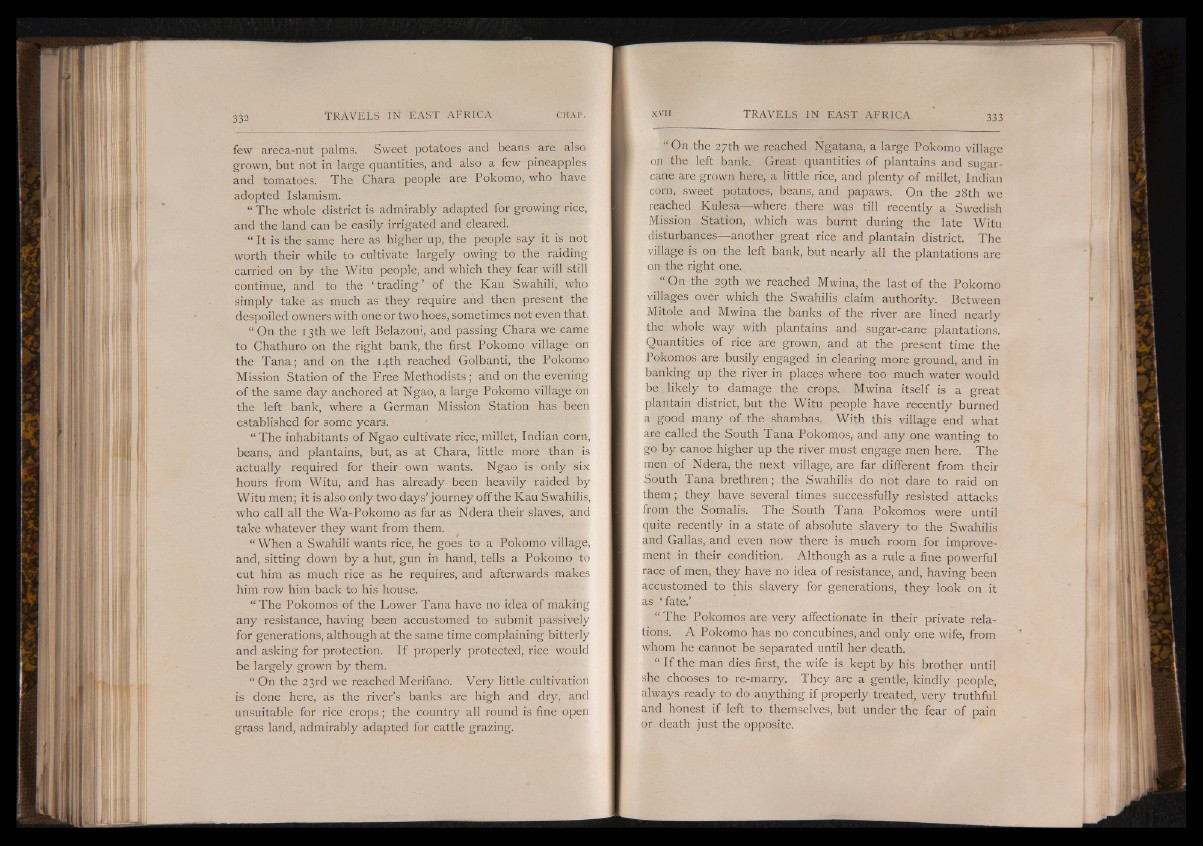
few areca-nut palms. Sweet potatoes and beans are also
grown, but not in large quantities, and also a few pineapples
and tomatoes. The Chara people are Pokomo, who have
adopted Islamism.
“ The whole district is admirably adapted for growing rice,
and the land can be easily irrigated and cleared.
“ It is the same here as higher up, the people say it is not
worth their while to cultivate largely owing to the raiding
carried on by the Witu people, and which they fear will still
continue, and to the ‘ trading ’ of the Kau Swahili, who
simply take as much as they require and then present the
despoiled owners with one or two hoes, sometimes not even that.
“ On the 13th we left Belazoni, and passing Chara we came
to Chathuro on the right bank, the first Pokomo village on
the Tana; and on the 14th reached Golbanti, the Pokomo
Mission Station of the Free Methodists; and on the evening
of the same day anchored at Ngao, a large Pokomo village on
the left bank, where a German Mission Station has been
established for some years.
“ The inhabitants of Ngao cultivate rice, millet, Indian corn,
beans, and plantains, but, as at Chara, little more than is
actually required for their own wants. Ngao is only six
hours from Witu, and has already- been heavily raided by
Witu men; it is also only two days’ journey off the Kau Swahilis,
who call all the Wa-Pokomo as far as Ndera their slaves, and
take whatever they want from them.
“ When a Swahili wants rice, he goes to a Pokomo village,
and, sitting down by a hut, gun in hand, tells a Pokomo to
cut him as much rice as he requires, and afterwards makes
him row him back to his house.
“ The Pokomos of the Lower Tana have no idea of making
any resistance, having been accustomed to submit passively
for generations, although at the same time complaining bitterly
and asking for protection. I f properly protected, rice would
be largely grown by them.
“ On the 23rd we reached Merifano. Very little cultivation
is done here, as the river’s banks are high and dry, and
unsuitable for rice crops; the country all round is fine open
grass land, admirably adapted for cattle grazing.
“ On the 27th we reached Ngatana, a large Pokomo village
on the left bank. Great quantities of plantains and sugarcane
are grown here, a little rice, and plenty of millet, Indian
corn, -sweet potatoes, beans, and papaws. On the 28th we
reached Kulesa— where, there was till recently a Swedish
Mission Station, which was burnt during the late Witu
disturbances— another great rice and plantain district. The
village is on the left bank, but nearly all the plantations are
on the right one.
“ On the 29th we reached Mwina, the last of the Pokomo
villages over which the Swahilis claim authority. Between
Mitole and Mwina the banks of the river are lined nearly
the whole way with plantains and sugar-cane plantations.
Quantities of rice are grown, and at the present time the
Pokomos are busily engaged in clearing more ground, and in
banking up the riyer in places where too much water would
be likely to damage the crops. Mwina itself is a great
plantain district, but the Witu people have recently burned
a good many of the shambas. With this village end what
are called the South Tana Pokomos, and any one wanting to
go by canoe higher up the river must engage men here. The
men of Ndera, the next village, are far different from their
South Tana brethren; the Swahilis do not dare to raid on
them ; they have several times successfully resisted attacks
from the Somalis. The South Tana Pokomos were until
quite recently in a state of absolute slavery to, the Swahilis
and Gallas, and even now there is much room for improvement
in their condition. Although as a rule a fine powerful
race of men, they have no idea of resistance, and, having been
accustomed to this slavery for generations, they look on it
as ‘ fate.’
“ The Pokomos are very affectionate in their private relations.
A Pokomo has no concubines, and only one wife, from
whom he cannot be separated until her death.
“ I f the man dies first, the wife is kept by his brother until
she chooses to re-marry. They are a gentle, kindly people,
always ready to do anything if properly treated, very truthful
and honest if left to themselves, but under the fear of pain
or death just the opposite.